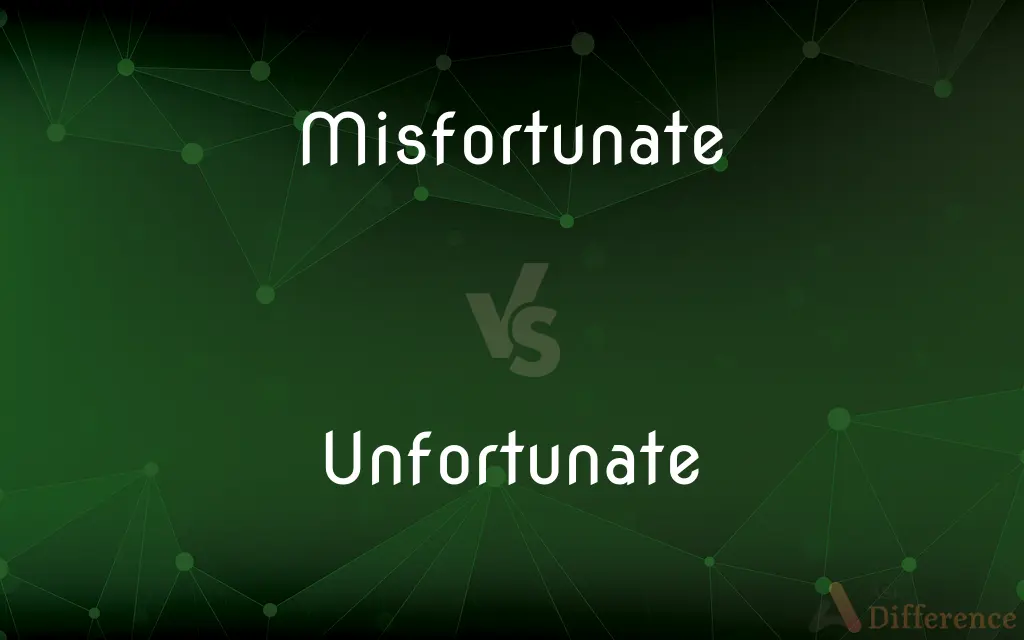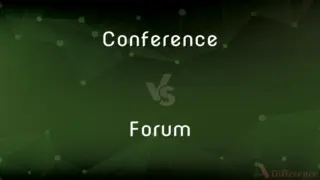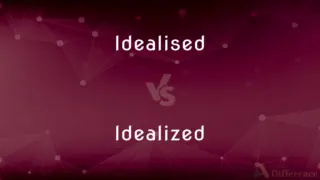Misfortunate vs. Unfortunate — What's the Difference?
By Tayyaba Rehman — Updated on October 6, 2023
Misfortunate is less commonly used and often refers to a person's propensity to experience bad luck. Unfortunate is more standard and describes something marked by misfortune or distress. Both denote negative circumstances.

Difference Between Misfortunate and Unfortunate
Table of Contents
ADVERTISEMENT
Key Differences
Misfortunate and unfortunate, though closely related in meaning, are nuanced in their application. Misfortunate, albeit less commonly used in modern English, typically refers to a person's tendency or susceptibility to encounter bad luck or adverse events. For instance, one might refer to someone constantly encountering mishaps as a misfortunate individual, suggesting an inherent quality of that person. On the other hand, unfortunate is a broader term that conveys a sense of regret or pity, usually relating to specific events or conditions.
Unfortunate is more standard in usage and carries a wider range of applicability. You can use it to describe situations, events, decisions, or even individuals. For example, an unfortunate event might refer to a sudden rainstorm during an outdoor event. Meanwhile, calling someone unfortunate could mean they're in a lamentable situation or that they often find themselves in undesirable conditions.
Misfortunate is occasionally misused in place of unfortunate, perhaps due to their phonetic similarities. However, the distinction remains that while both words indicate negativity, misfortunate leans more towards a character trait, whereas unfortunate pertains more to situations or circumstances.
In sum, while the nuances between misfortunate and unfortunate might seem subtle, their specific contexts and applications are distinct. As language evolves, it's possible the usage of these terms might shift further, but currently, unfortunate remains the more universally applicable and understood term.
Comparison Chart
Primary Definition
Relating to a propensity for bad luck or mishaps.
Marked by or resulting from bad fortune or luck.
ADVERTISEMENT
Usage
Less common in modern English.
Standard and widely used.
Context
Typically describes people.
Can describe people, events, situations, and decisions.
Synonym
Luckless
Regrettable, lamentable
Grammatical Form
Often used as a noun (misfortunate person), but can be an adjective.
Primarily an adjective, but can also be a noun (e.g., "an unfortunate").
Compare with Definitions
Misfortunate
Characterized by unfortunate happenings.
His misfortunate trip involved missed flights and lost luggage.
Unfortunate
Producing or resulting in misfortune.
The unfortunate decision led to many issues.
Misfortunate
Prone to experiencing bad luck.
Jane seems so misfortunate; she always spills her coffee.
Unfortunate
Being in a saddened or pitiable state.
The homeless are the unfortunates of society.
Misfortunate
Often encountering undesirable circumstances.
He's a misfortunate soul, always in the wrong place at the wrong time.
Unfortunate
Marked by bad fortune or luck.
An unfortunate turn of events cancelled the festival.
Misfortunate
Having a tendency to face adverse events.
Being misfortunate, she always carried an umbrella.
Unfortunate
Regrettable or lamentable.
It's unfortunate that we can't attend the party.
Misfortunate
Especially of a person: unfortunate.
Unfortunate
Having or marked by bad fortune; unlucky
There'd been an unfortunate accident
Misfortunate
An unfortunate person; (with the and plural concord) unfortunate people as a class.
Unfortunate
Regrettable or inappropriate
His unfortunate remark silenced the gathering
Misfortunate
Having suffered misfortune; pitiable
Unfortunate
A person who suffers bad fortune
Those unfortunates whose lives are marred by poverty
Misfortunate
Producing misfortune.
Unfortunate
A person who is considered immoral or lacking in religious faith or instruction, especially a prostitute.
Misfortunate
Deserving or inciting pity;
A hapless victim
Miserable victims of war
The shabby room struck her as extraordinarily pathetic
Piteous appeals for help
Pitiable homeless children
A pitiful fate
Oh, you poor thing
His poor distorted limbs
A wretched life
Unfortunate
Having bad luck; unlucky.
Misfortunate
Suffering frequent misfortunes.
In tales, the misfortunate hero often finds redemption by the end.
Unfortunate
Characterized by, bringing, or causing misfortune
An unfortunate turn of events.
Unfortunate
Regrettable; deplorable
An unfortunate lack of good manners.
Unfortunate
A victim of bad luck.
Unfortunate
Not favored by fortune
Unfortunate
Marked or accompanied by or resulting in misfortune
Unfortunate
An unlucky person; one who has fallen into bad circumstances.
Unfortunate
A prostitute.
Unfortunate
Not fortunate; unsuccessful; not prosperous; unlucky; attended with misfortune; unhappy; as, an unfortunate adventure; an unfortunate man; an unfortunate commander; unfortunate business.
Unfortunate
A person who suffers misfortune
Unfortunate
Not favored by fortune; marked or accompanied by or resulting in ill fortune;
An unfortunate turn of events
An unfortunate decision
Unfortunate investments
An unfortunate night for all concerned
Unfortunate
Not auspicious; boding ill
Unfortunate
Unsuitable or regrettable;
An unfortunate choice of words
An unfortunate speech
Unfortunate
Not favored by fortune; unlucky.
He was unfortunate to miss the winning goal.
Common Curiosities
Which is more commonly used: misfortunate or unfortunate?
Unfortunate is more commonly used in modern English.
Can I use misfortunate to describe an event?
While it's possible, unfortunate is the more appropriate term for events.
Is misfortunate synonymous with unlucky?
It's close. Misfortunate often refers to someone prone to experiencing bad luck.
Can unfortunate describe decisions?
Yes, it can be used to describe decisions that lead to regrettable outcomes.
Is misfortunate a standard term in English?
Misfortunate is less common and can sometimes be seen as a nonstandard variant of unfortunate.
Can unfortunate be used to describe a person?
Yes, it can describe someone who faces negative circumstances or is in a lamentable state.
Is there a noun form for unfortunate?
Yes, "an unfortunate" can be a noun referring to a person in a pitiable state.
Does misfortunate always refer to inherent bad luck?
Typically, but context matters. It often suggests a propensity towards unfortunate events.
Why might someone use misfortunate over unfortunate?
They might believe it emphasizes a consistent string of bad luck or may use it mistakenly due to phonetic similarities.
Can I use misfortunate to describe a regrettable decision?
It's more appropriate to use unfortunate for regrettable decisions.
Are the terms interchangeable?
Not always. While related, they have nuanced differences and distinct applications.
Which term is older: misfortunate or unfortunate?
Both have old origins, but unfortunate has been in use longer in the form we recognize today.
Is unfortunate always negative?
Generally, yes. It describes negative situations, outcomes, or states.
How can I remember the difference between the two?
Think of misfortunate as a trait (prone to mishaps) and unfortunate as a description of situations or outcomes.
Can something be both misfortunate and unfortunate?
Yes, someone can be misfortunate (prone to mishaps) and have an unfortunate event occur.
Share Your Discovery

Previous Comparison
Conference vs. Forum
Next Comparison
Idealised vs. IdealizedAuthor Spotlight
Written by
Tayyaba RehmanTayyaba Rehman is a distinguished writer, currently serving as a primary contributor to askdifference.com. As a researcher in semantics and etymology, Tayyaba's passion for the complexity of languages and their distinctions has found a perfect home on the platform. Tayyaba delves into the intricacies of language, distinguishing between commonly confused words and phrases, thereby providing clarity for readers worldwide.














































